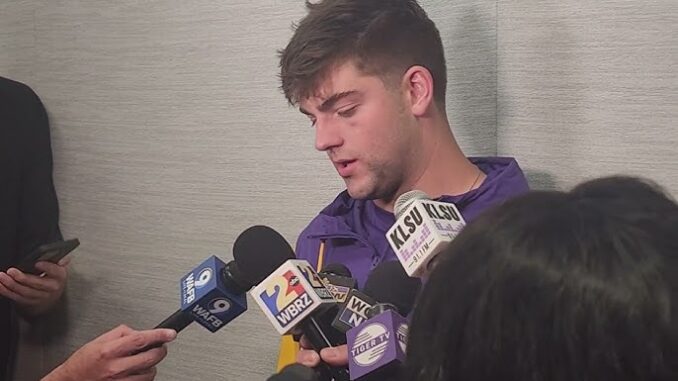
LSU’s overreliance on QB Garrett Nussmeier continues a dubious trend for program under Brian Kelly
Nussmeier has six turnovers in two games, but LSU hasn’t done much to help
Trailing by 15 points in the third quarter, LSU decided to put the ball into the hands of its best player, quarterback Garrett Nussmeier. After a rush on the first play from Zavion Thomas, Nussmeier either threw or ran on 10 straight plays to get LSU from its own 25-yard line to the Alabama 5-yard line with a chance to reach the end zone.
Running back Josh Williams recorded a single carry to try and extend the drive, but LSU didn’t trust anyone but Nussmeier to get into the end zone. Nussmeier dropped back and rifled towards receiver CJ Daniels on an in-breaker to the end zone.
Alabama linebacker Deontae Lawson turned around. He jumped up and intercepted the pass. The drive was over. The Tide turned it into a touchdown eight plays later — a 19-yard scamper by Jalen Milroe. It was the final whimper for LSU in a 42-13 loss against the No. 11 Tide that all but eliminated them from College Football Playoff contention. It was one of three turnovers for Nussmeier, his sixth turnover in two games.
Nussmeier has received plenty of blame for the back-to-back losses against Texas A&M and Alabama — and for some good reasons. His red zone turnovers have been backbreaking during the Tigers’ run. But ultimately, it misses the point. The coaching staff is putting way too much on the quarterback position and expecting him to bail out fatal deficiencies on this roster.

The first-year starter wasn’t great in the loss, completing 27-of-42 passes for 239 yards and only one touchdown to go with his three turnovers. However, even in a poor performances, the passing game was one of the only things that worked against Alabama.
Nussmeier ultimately was responsible for 48 of LSU’s 66 offensive plays, an absurd 72.7%. For comparison, Alabama quarterback Jalen Milroe — the top rusher on his team — was responsible for only 45% of the Tide’s plays. Nussmeier throws the ball 41.7 times per game, which trails only Syracuse’s Kyle McCord for the most among any power conference quarterback.
Unfortunately, leaning on the quarterback until he breaks has become a trend in Baton Rouge. Last year, it led to Jayden Daniels winning the Heisman after recording 55% of LSU’s plays. It’s also part of why Brian Kelly is only 16-6 over the last two years and will finish outside of the top 10 for his third straight season.
For unclear reasons, LSU has completely abandoned the running game. Freshman running back Caden Durham touched the ball only eight times despite hitting 63 yards and 7.9 yards per carry. Non-Nussmeier rushers posted 96 yards on only 18 carries. It’s inexplicable the level to which LSU gives up its ground game. The freshman Durham especially has been largely erased in key spots despite consistently excellent production.
Of course, the defense remains a total disaster in a way that’s hard to fathom for a Kelly-coached LSU team. For the second straight week, the Tigers were completely befuddled by the quarterback running game. Two weeks ago, Texas A&M’s Marcel Reed broke off three touchdown runs and hit 62 yards on nine carries. Milroe made it worse, reaching 185 yards and four touchdowns on only 12 carries.
Certainly, first-year defensive coordinator Blake Baker has helped. A jump from No. 108 to 69 in total defense won’t win any national awards, but it’s a legitimate improvement. What’s slightly more confusing is the level to which LSU’s defensive talent has slipped.
Since LSU’s first national championship draft class under Nick Saban in 2004, 72 defensive players have been selected in the NFL Draft, an average of 3.4 per year. There have been multiple defenders picked from LSU in every draft class since then. That streak is in serious danger with the personnel deficiencies in 2024.
Linebacker Harold Perkins is the only player ranked in the top 100 in the CBS Sports NFL Draft Prospect Rankings, and he suffered a torn ACL. Defensive back Major Burns was the only other defensive preseason All-SEC selection. Among 50 SEC defensive backs with at least 400 snaps, Burns ranks 44th in defensive grade. Defensive end Bradyn Swinson has played reasonably well with eight sacks, but was invisible against Alabama. Linebacker Whit Weeks is the one serious playmaker on defense with 90 tackles and eight tackles for loss. However, he’s a true sophomore and not draft eligible.
All that to say, the era of Derek Stingley Jr, Devin White, Tyrann Mathieu and Patrick Peterson seems to be over. Even though Kelly continues to recruit well and boasts the No. 8 roster in the 247Sports Talent Composite (ahead of Penn State, Notre Dame, Tennessee and Ole Miss), development is not coming through on defense.
The real irony is that somehow the marriage of Kelly and LSU has turned into a program of elite quarterbacks and incomplete rosters. For decades, both Kelly and LSU were defined by their failures to find quarterbacks. Prior to Joe Burrow, only three LSU quarterbacks were ever selected in the first round: JaMarcus Russell (2007), Bert Jones (1973) and Y.A. Tittle (1948). Nussmeier can become the third in a year or two. Even heading forward, the Tigers have a commitment from Bryce Underwood, the No. 1 overall player in the Class of 2025.
There’s something to be said for a team giving the ball to its best players. For LSU under Kelly, that has been the quarterback and receivers. At this point, though, it’s predictable. Whether LSU can grow its roster around the line of prodigious quarterbacks will ultimately define whether Kelly can become the fourth straight LSU coach to win a national championship.
Early returns aren’t good.

Leave a Reply